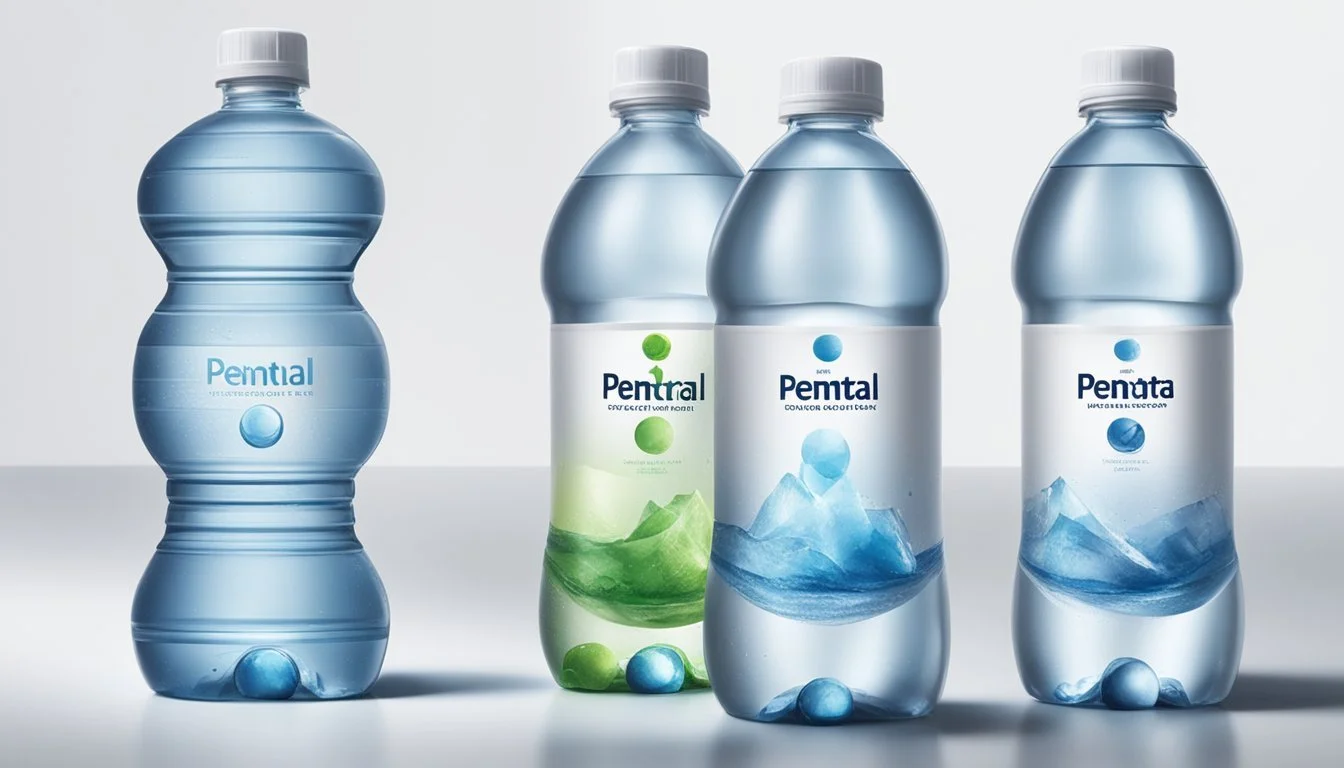Eternal vs. Penta
An Unbiased Comparison of Bottled Water Brands
Bottled water has become a staple in the daily lives of many, serving as a convenient source of hydration. Various brands compete in the market, promising not only to quench thirst but also to offer quality and taste that stand out from their rivals. Two such brands are Eternal and Penta, each with its own unique selling points and loyal customer base. Eternal prides itself on its naturally alkaline spring water from protected, pristine sources in the United States. Penta, on the other hand, emphasizes its ultra-purified water with added electrolytes for taste and a proprietary purification process.
The selection between Eternal and Penta bottled water may seem trivial to some, but for the health-conscious consumer, it can be a choice of paramount importance. Water quality, taste, the method of purification, and even the type of bottles used can influence the decision. Eternal touts a naturally occurring high pH level, a result of minerals imparted during its underground journey, claiming to provide better hydration. Penta, focusing on the science of hydration, uses a 13-step purification process to ensure purity and consistency in every bottle.
With hydration being a key factor in overall health and well-being, choosing the right bottled water is more than just a matter of taste; it's about the benefits it brings to the table. Consumers weigh these factors when deciding which brand to buy, looking not just for refreshment but also for wellness benefits that some brands allege. Comparing Eternal and Penta's approaches to bottled water production reveals a broader narrative of how two companies can interpret the mission of delivering clean, beneficial water in distinctly different ways.
Understanding Bottled Water
When choosing bottled water, consumers should consider the type and source of water, the purification methods used, and how these factors contribute to health and hydration.
Types and Sources of Bottled Water
Bottled water can originate from natural springs, aquifers, or municipal tap water sources. Spring water flows to the surface from a natural underground aquifer and may contain a variety of minerals like magnesium and calcium. Natural spring water is often characterized by its origin and may retain its natural minerals. Alternatively, water sourced from an aquifer, a permeable rock layer that contains water, can be classified as groundwater. As it travels, it may pick up minerals, making it slightly alkaline.
Spring Water: Collected from springs where water naturally surfaces.
Mineral Water: Contains a minimum level of minerals directly from the source.
Alkaline Water: Has a higher pH level, sometimes naturally alkaline from the source or artificially ionized.
Purified Water: Treated water that comes from any source, including tap water.
Purification Processes
Purification is essential to ensure safety and improve taste. Purified water has undergone processes such as distillation, deionization, reverse osmosis, or filtration to remove contaminants. Reverse osmosis, for example, forces water through a semi-permeable membrane, stripping away pollutants as well as some beneficial minerals. Some brands choose to re-introduce electrolytes or minerals such as magnesium or sodium to enhance the water’s profile.
Reverse Osmosis: Removes contaminants and may also remove beneficial minerals.
Distillation: Involves boiling water and condensing the steam to eliminate impurities.
Ionization: Creates alkaline water by altering the pH level through an electrical process.
Health and Hydration
Drinking water is crucial for maintaining hydration, dissolving vitamins and minerals, and delivering nutrients throughout the body. Electrolytes, like sodium and potassium, are essential for proper hydration as they regulate bodily fluids. The pH level of water can range from acidic to basic (alkaline), with a neutral pH of 7. Some studies suggest that alkaline water with a higher pH could help neutralize acid in the bloodstream, although research is ongoing. Oxygenated water, with added oxygen, is marketed for enhanced energy and recovery, but empirical evidence to support these claims is limited.
pH Level: Alkaline waters have a higher pH level, above the neutral 7.
Electrolytes: Elements that are critical for cell function and hydration.
Minerals: Often found in natural waters, essential for various bodily functions.
Comparative Analysis of Eternal and Penta
Eternal and Penta are prominent brands in the bottled water industry, each boasting unique qualities. This section provides insights into their histories, sources, taste, nutrient contents, and environmental impacts.
Brand Histories and Reputation
Eternal Water originates from naturally protected sources in remote locations such as the Smoky Mountains, and it has carved out a reputation for being naturally alkaline with a high pH level. Penta Water, meanwhile, is known for its ultra-purified drinking water, subjected to a patented 13-step purification process that claims to provide water of exceptional purity.
Source and Production
Eternal Water is sourced from natural springs, such as those in the Smoky Mountains and remote parts of Arkansas, where the ecosystem's pristine conditions naturally filter and infuse the water with minerals. Penta's production, on the other hand, occurs domestically using a comprehensive purification system that includes UV, microfiltration, and reverse osmosis, ensuring the removal of more contaminants than standard filtration methods.
Taste and Quality
The taste of Eternal Water is often described as clean and crisp due to its natural filtering through volcanic rocks which enhances its mineral content. Penta prioritizes purity over taste, removing almost all minerals and constituents from the water, giving it a distinct taste profile that some consumers describe as 'pure' and 'refreshing'.
Nutrient Profile Comparison
Nutrient Eternal Water Penta Water pH Level High (Alkaline) Neutral Electrolytes Present Absent Minerals Natural Minerals Removed in Purification Process Eternal naturally contains minerals like magnesium and sodium, which are retained due to the nature of its source. Penta, due to its extensive purification, strips away such minerals, resulting in a product with a near-neutral pH level and devoid of naturally occurring electrolytes.
Packaging and Environmental Impact
Eternal Water provides its natural spring water in PET bottles, which they claim to be BPA-free and 100% recyclable. Penta also packages its water in recyclable plastic bottles and emphasizes its commitment to sustainability, yet the environmental impact of producing purified bottled water and the challenges of ensuring bottles are actually recycled remain concerns for both brands.
Market Presence and Consumer Opinion
Eternal and Penta bottled water brands occupy distinct positions in the bottled water market, each with a unique consumer base. Their market presence and consumer opinions are shaped by factors including availability, reviews, and expert insights.
Availability in Grocery Stores
Eternal water is typically stocked in local grocery stores alongside well-known brands such as Fiji, Smartwater, and Aquafina. Penta, on the other hand, is less frequently found in standard grocery aisles, suggesting a more selective distribution strategy. While major chains often feature a wide range of bottled waters, including Essentia, Icelandic Glacial, and Core Hydration, the shelf presence of Eternal reflects its broader market appeal compared to Penta.
Online Reviews and Ratings
Consumer feedback and ratings on e-commerce platforms paint a picture of each brand's reputation. Reviews of Eternal often highlight its purity and natural alkaline properties. Penta, boasting a patented purification process, receives praise for its water taste and purity. Ratings generally favor Eternal for its value and accessibility, while Penta is commended for its specialized purification approach, despite a higher price point.
Eternal Bottled Water
Average Rating: 4.5 stars
Notable Comments: Natural alkalinity, cost-effective
Penta Bottled Water
Average Rating: 4.7 stars
Notable Comments: Ultra-pure, beneficial minerals
Water Sommelier Insights
Water sommeliers, whose expertise is in discerning the subtle nuances of water taste, provide an authoritative perspective on bottled water brands. While names like Voss and Fiji are often celebrated for their taste and branding, water experts also recognize the superior qualities of less marketed brands such as Castle Rock and Acqua Panna. In the case of Eternal and Penta, sommeliers note Eternal's natural taste profile derived from the Shasta-Trinity Alps and Penta's high level of purity due to its extensive filtration process. Among specialized circles, Penta is often highlighted for its purity while Eternal is acknowledged for blending quality with availability.




